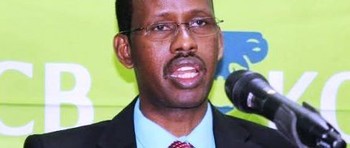KCB mulls investment in South Sudan after overcoming crisis

Kenya Commercial Bank (KCB) said it plans to step up investment in South Sudan in a bid to increase its presence across the world’s youngest nation.
Roba Waqo Jaldesa, KCB South Sudan managing director told reporters in Juba on Thursday that Kenya’s largest bank by asset plans to increase its customer base after overcoming a five-year civil war.
Waqo further said they have started reopening branches that were affected by the civil war and introduced mobile banking to increase the 122,000 customer base to over 200,000 by the end of 2020.
“We came to this country in 2006 as the first foreign bank and we have resiliently survived these challenges. That tells you we are not going anywhere. Now we are up in terms of focusing on expanding. This year, we have opened one new branch and we are looking forward to open the ones we temporally closed,” Waqo said.
"We will still not shy away from investing in South Sudan because we are there for long, we are not a temporary investor in South Sudan, we are a permanent investor in South Sudan," he added.
Separately, Waqo said introducing the mobile banking technology would enhance the service being provided by the financial institution. Waqo said he is optimistic that the country’s economy will grow stronger.
“Our economy is very resilient, we are projecting the economy is coming up strongly and there is lot of hope in the hearts and minds of the entrepreneurs,” he stressed.
Meanwhile, the bank’s head of finance, Granton Ndungwa said KCB had 32 billion South Sudanese Pounds in balance sheet by July.
“We have enough capital to invest in the market both in terms of brick and mortar and also in terms of technology,” he explained.
KCB, which is east Africa's largest lender by assets, closed 12 of its 23 branches in South Sudan in 2016 and 2017 after a devastating civil war that affected the economy.